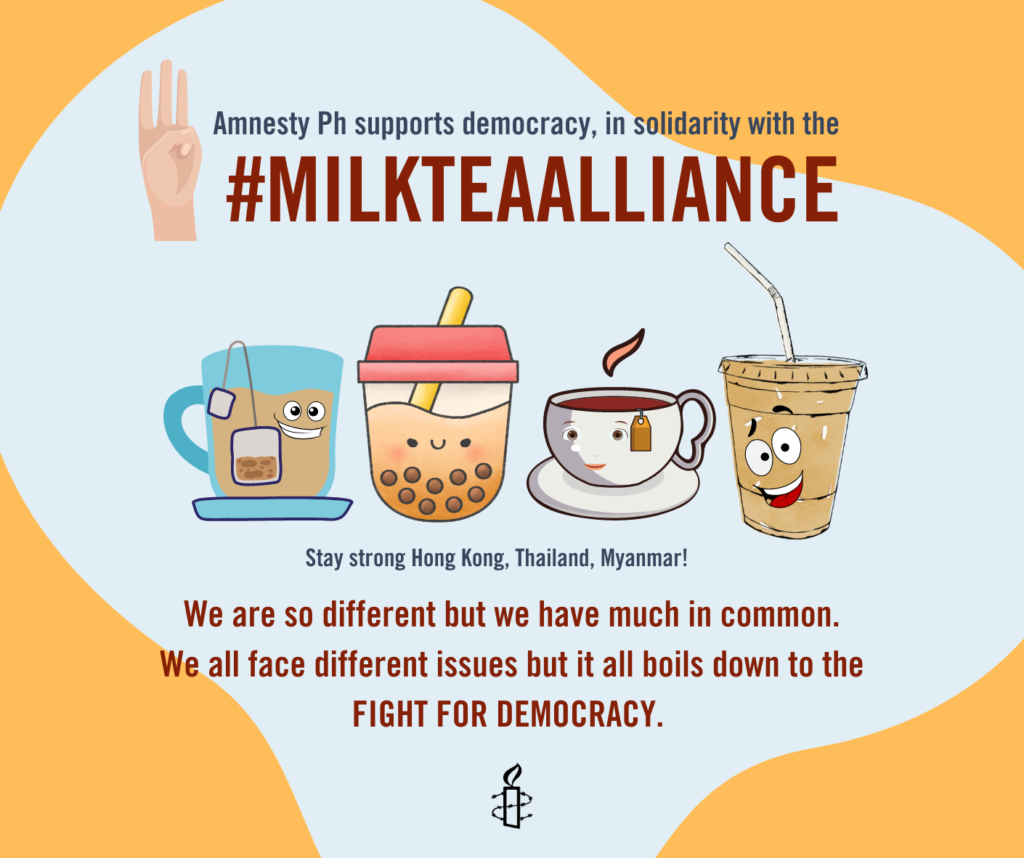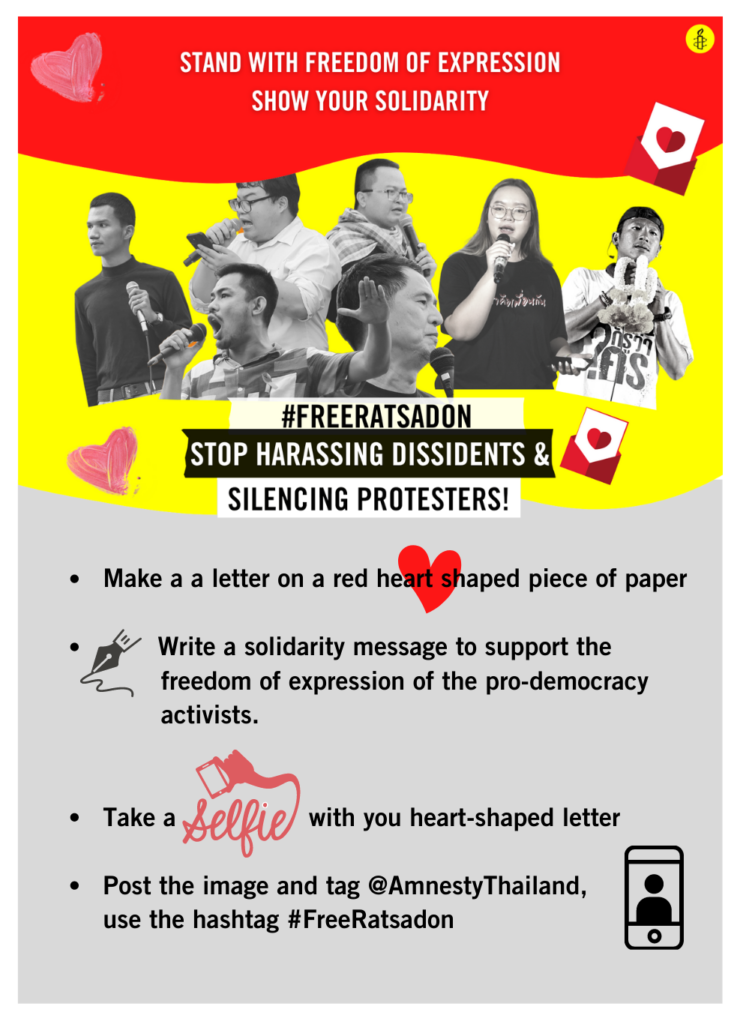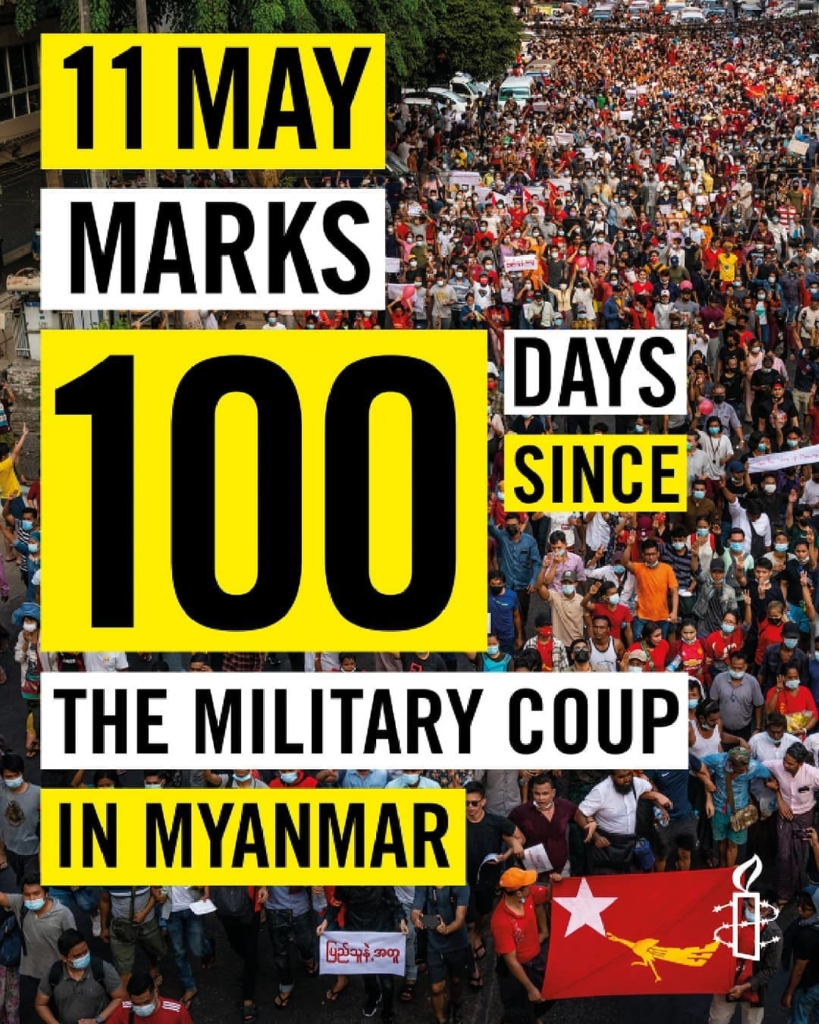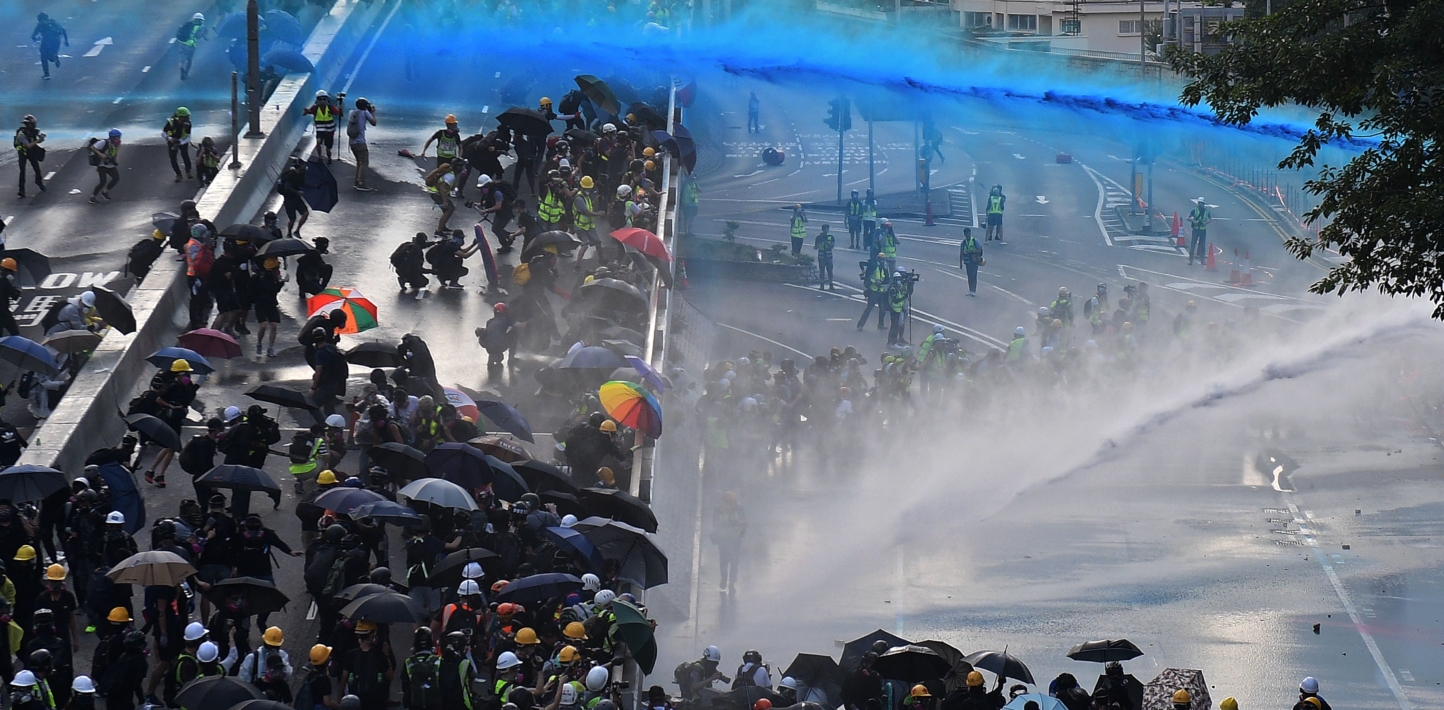How do you take your tea? With milk and a heavy helping of democracy
Sharing tips about safety during street protests, on how to avoid cyber threats for online activists in the region, first aid care during violent dispersals and ensuring that violations on freedom of expression and association do not remain a secret within their countries, the milk tea alliance is leaderless – and governments see this a threat to their authority.
Images of thousands of people peacefully rallying in main cities have travelled around the world, in the latest illustration of how youth-led protests are defying growing repression.
Thailand’s protesters previously made headlines for their use of the Hunger Games salute, Harry Potter memes and the Japanese anime hamster, Hamtaro.
But behind the light-hearted fun, the movement keeps growing, based on calls for political reforms and denouncing the harassment of people who criticize the government.
Authorities have responded by intensifying their crackdown and harassing peaceful protesters even more. The rights to freedom of expression and peaceful assembly are enshrined in the Universal Declaration of Human Rights – but these rights are increasingly under attack in East Asia and Southeast Asia.
Leaderless Youth-led movement

School children are also speaking up. Activists have been holding peaceful protests and the rallies have gathered momentum. Authorities continue to intimidate, harass and discourage the youth from taking part in further protests.
Such scare tactics were denounced by the UN children’s agency, UNICEF, who reminded the authorities that the youth “can constructively voice their opinions.” People of all ages have taken to the streets to show their support.
There are various similarities between Thailand’s protests and the mass demonstrations which erupted in Hong Kong in 2019. As well as being led by young people, both movements mostly define themselves as “leaderless”. Marches have been organized organically by individual protesters – often using apps such as Telegram. This is an intentional tactic that makes it more difficult for the authorities to curb activism by targeting figureheads.
The shadow of past crackdowns hangs over these protests
The region has witnessed mass youth protests in the past. In Thailand, many youth protesters were repeatedly detained and faced years-long criminal proceedings for conducting symbolic actions like gathering in public spaces to eat sandwiches, holding one-person readings of the novel ‘1984’, or raising the three-finger salute from the Hunger Games films, some even received prison prison sentences for various criminal charges.
Since 2019, Hong Kongers have taken to the streets to demand accountability in the face of abusive policing tactics that have included the wanton use of tear gas, arbitrary arrests, physical assaults and abuses in detention. This struggle against the established order has been repeated all over the continent.
Nowhere is safe from intimidation – especially not Facebook and Twitter
People who express their views on the streets aren’t the only ones being harassed, even actions expressing support on social media are used to charge individuals using very vague laws – a tactic that has a chilling effect on millions more social media users across the region.
In 2020, Amnesty International released “They are always watching”, a research report showing how the Thai authorities are prosecuting social media users who criticize the government and monarchy, including human rights defenders, activists, politicians, lawyers and academics.
Increasingly, Facebook and Twitter are becoming the targets of government disinformation and censorship. Authorities have tried to prevent the use of Telegram, a favorite tool for protest organizers. They have also tried to shut down the social media channels of prominent activist groups.
In 2019, Myanmar authorities ordered telecommunications providers to block mobile internet access in nine townships in Rakhine and Chin States. The shutdown was lifted in five townships in late August 2019, but reinstated in February 2020. Authorities arrested several individuals for criticizing the internet shutdown.
Students in Sittwe in Rakhine State, Chin States and Yangon organized a protest against government directives restricting internet access. Yangon students organized even organized a ‘sticker campaign’ to call attention to ongoing human rights abuses. The protest included the posting of stickers in various public places with messages such as: ‘Restore 4G Internet Access’, ‘No Bloody Government’, ‘No Murder Army’, ‘No Trust in Rakhine State Government’, ‘Oppose Fascism’, and ‘Stand With People in Rakhine’. As a result of these campaigns, dozens of students and others faced charges.
From students in Hong Kong leading a mass movement against growing Chinese encroachment, to Thailand’s young voters are pushing back against ongoing state repression, online and offline, youth-led popular protests are challenging the established order.
What you can do to show your solidarity to the #MilkTeaAlliance
Social Media Action for Thailand
Thai authorities issued arrest warrants for 15 pro-democracy leaders and activists for their role in a mass gathering in Bangkok, Thailand’s capital, on 18 July 2020. Sixteen other protestors have been summoned and charged and all 31 face serious allegations including sedition. If convicted, each activist could face up to seven years in prison.
Amnesty is calling for:
- Immediately drop all charges against the 31 protestors and other individuals charged solely for exercising their rights to freedom of peaceful assembly and expression;
- Cease all attempts or operations aimed at dissuading public participation in peaceful gatherings or silencing voices critical of the government and social issues;
- Amend or repeal all broadly-worded, repressive, or vague legislation and regulations to conform with the country’s commitments to respect, protect, and fulfil the rights to freedom of peaceful assembly and expression.

The world needs to stand with the people of Myanmar now
11 May marks 100 days since the military coup in Myanmar. Almost 800 people – including children- have been killed by the Myanmar security forces. Over 3,800 people have been arrested – including journalists, doctors, students, activists, community leaders, political opponents and critics of the military.
How can this bloody repression in Myanmar end? Only when we urge governments and businesses across the world to join together to deny the military the means to continue abusing the people of Myanmar and when perpetrators are held accountable for human rights atrocities.
For decades, the military has ruled the 54 million people in Myanmar through violence and cruelty, committing atrocities whilst exploiting the country’s natural resources for personal gain.
In 2015, a civilian government was elected, although the military still held onto a lot of power. But on 1 February 2021, the day a new parliament would take office after the 2020 elections, the Myanmar military seized power once more after detaining elected leaders.
An estimated 1 million people from hundreds of towns flooded the streets in overwhelmingly peaceful protests.
Myanmar security forces responded with bloodshed, abductions, imprisonment and torture. They are using battlefield weapons including light machine guns, sniper rifles, and semi-automatic rifles against peaceful protesters and bystanders. They continue to wage war in ethnic minority areas, resulting in civilians being killed or injured and having to flee their homes. The military has cut off the internet to hide the brutality of their attacks.
Despite bloody crackdowns, people in Myanmar have not given up. Join us and stand together with the people of Myanmar – for freedom, for human rights.



